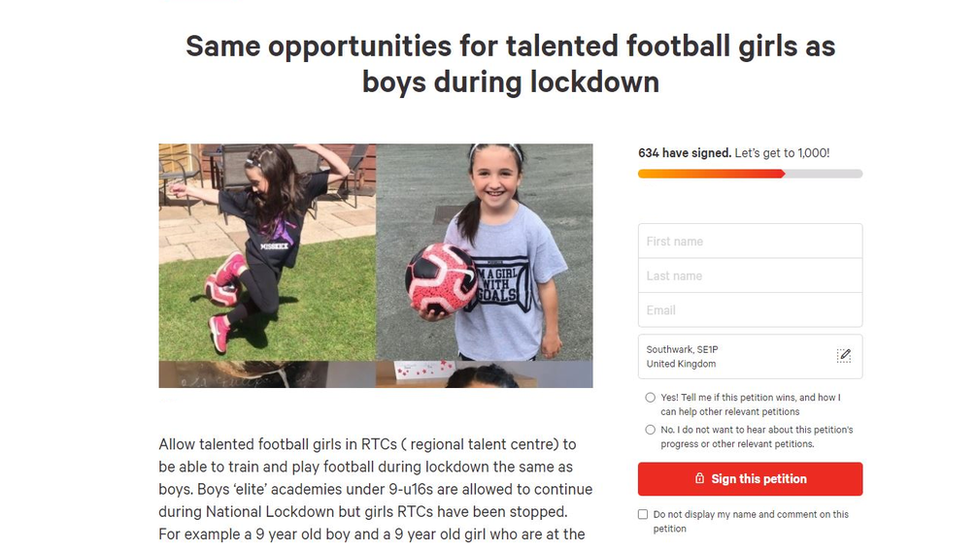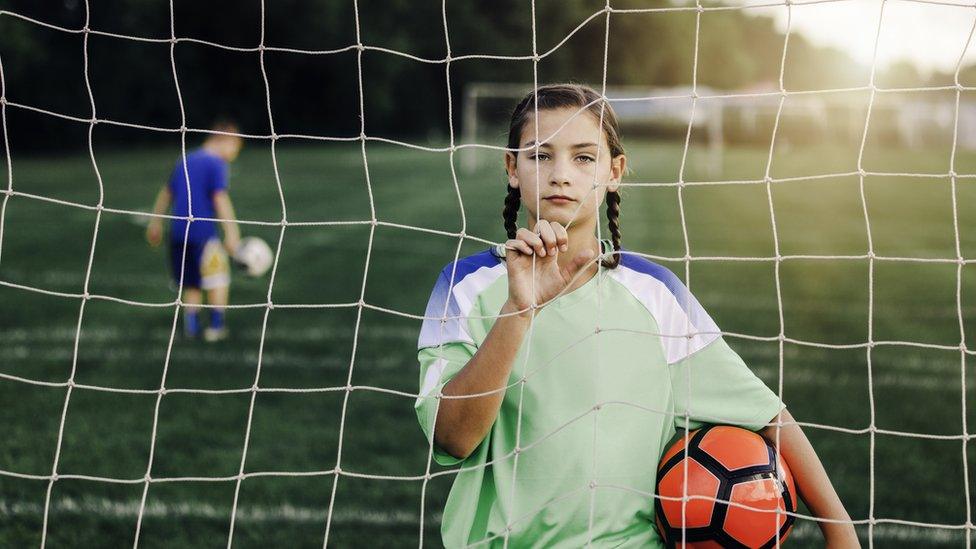Girls' football: FA 'not sending the right message' to girls, says Ellie aged 9
- Published
- comments
Ellie: 'I'm annoyed boys can still play during lockdown and girls can't'
The Football Association is "not sending the right message to girls aspiring to progress in football" - that's according to nine-year-old Ellie, who is calling on the FA to allow young female footballers to be able to carry on training during lockdown.
Both girls' academies and girls' regional talent clubs (RTC) in England had been told they had to close until 2 December, while boys of the same age and at the same clubs at academies have been allowed to continue to play.
The Football Association (FA) has now said that girls' football academies, for ages 16 and over, can reopen during lockdown if they can meet certain requirements put in place to keep players safe, but facilities for girls under 16 will remain closed.
This is because the government's lockdown rules say that only 'elite' athletes can continue to train, and while football academies for boys are classed as 'elite', the equivalent for girls are instead considered 'grassroots'.
Ellie, who has been doing weekly training sessions with Wigan Athletic, started a petition to try to persuade the FA to change its mind.
She says she's pleased to hear that some girls might now be able to return to training, but that "change is still needed" so that girls have access to the same 'elite' opportunities as the boys.
Speaking to Newsround, Ellie said: "The FA need to look at changing the label of 'grassroots' to 'elite' for talented girl footballers from age 8 the same as the boys, to value the girls for their talent. Currently girls cannot be called 'Elite' until they are 18 years old but boys can from 8 years.
"This does not send the right message to girls aspiring to progress in football, and suggests there is no professional opportunities for girls in football, and this is not true."
She added: "By calling them grassroots and funding it as grassroots then they are not getting the same access to talent pathway opportunities.
"It will take time for change, and funding is the important point, but a starting point would be to raise their profiles by sending the message to girls that there are opportunities in football."

Ellie's petition has got a lot of support
Some senior women's teams have also been affected by the rules, with many players due to compete in the Women's FA Cup also falling outside of the "elite" definition.
The move was also criticised by former Arsenal player Alex Scott who tweeted: "Hoping this decision gets changed, and gets changed quickly at that!! Actions speak louder than words 'Football for All'."
Charity Women in Sport also spoke out on the issue, calling the decision "outrageous".
Now the FA, who runs the women's game, has made the rules clearer - saying that, if girls academies can put in place special measures called 'elite protocols', they will be allowed to open.
These include things like temperature checks, regular coronavirus tests, and being able to manage symptoms and players if they become ill.
But because of how much it costs to put these measures in place, the FA says it's likely only "one or two" girls academies will be able to afford to meet them, and therefore reopen before lockdown ends.
Meanwhile RTCs, somewhere where girls aged 9-16 train until they are old enough to move to an academy, won't be able to reopen until lockdown ends on 2 December.
Why are the rules for boys' and girls' football different?

The girls' game in England is controlled by the FA, whereas the boys' game is overseen by the Premier League and English Football League clubs.
The training pathways for boy and girls are also a bit different. Girls begin at a RTC at an under 10s level, of which there are 32 around the UK.
When they get older, the best players will move onto a girls' academy in the Women's Super League for 16 to 21-year-olds.
In contrast, boys start their training in an academy and remain there as they get older.
Currently boys in football academies are referred to as elite from the age of 8, but girls cannot become elite until they sign professionally at 18.
Boys' academies also have big budgets and extensive resources, with lots of staff and facilities which mean putting in place coronavirus safety measures to protect their players isn't all that difficult.
But girls' academies are nowhere near as well resourced, so it's much more difficult for them to put these in place.
What have the FA said about the situation?

The FA said it knows that many girls' academies won't have the resources to reopen.
Kelly Simmons, the FA's director of the women's professional game, said: "It is a big gear change to move from grassroots to elite protocol, especially overnight.
"If the clubs could do that, then they could they could operate, but it's a big challenge for the women's game."
She added: "It is heartbreaking to think that's the situation for girls, but our duty as the FA is to make sure those girls are safe.
"Unfortunately the women's game doesn't have the same resource level as the men's game and therefore we can't risk putting those players in an environment without everything there needs to be."
What has the reaction been like so far?

Ellie says the decision to force girls' academies and RTCs to close in the first place was "extremely unfair", and is calling on the FA to recognise girls' academies and RTCs as 'elite' in the same way as boys'.
Casey Stoney, manager of Manchester United Women, shares Ellie's view, saying: "I class our regional talent club and academy as 'elite' because they're at Manchester United.
"They're training to become professional players, just like the boys are, but unfortunately it's not seen that way in terms of governance.
"That's one of the things that has got to change. It's really disappointing, but it's the classification of the academies."
So far the FA hasn't responded to these comments.
Meanwhile, charity Women in Sport said they welcomed the FA's "change in tone with girls' academies now able to reopen if they are able to meet elite protocols".
But it added: "It is a hollow victory, as those involved know full well that the girls' academies are unlikely to be able to find the funds to meet this requirement."
- Published10 November 2020

- Published9 November 2020

- Published3 November 2019

